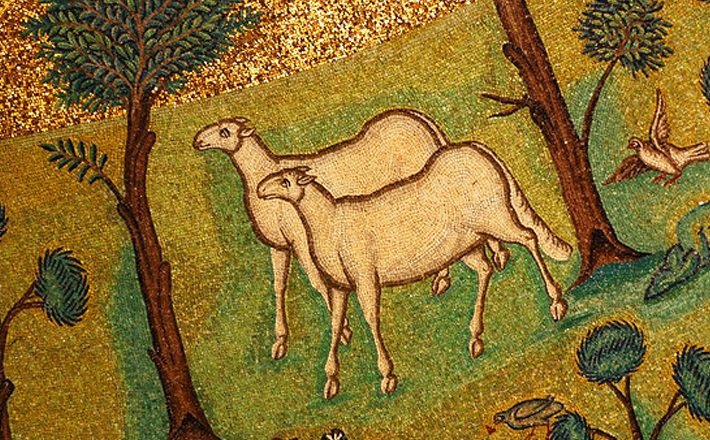Commentary on Mark 6:30-34, 53-56
A lot happens in the sixth chapter of the Gospel of Mark. Jesus is rejected in his hometown.
He sends the twelve on mission. John the Baptist is killed. Jesus feeds the five thousand and walks on water. These are all major events in Mark’s narrative, so much so that the passages appointed for today pale in comparison. Sure, Jesus heals many people in the end, but otherwise these pericopes seem to have missed the dramatic boat.
But in fact, the passages that make up the Gospel reading for today serve in important ways to advance Mark’s central concern: the inauguration of the kingdom of God in Jesus. These verses emphasize Jesus’ identity as the true, divine shepherd, who will guide his sheep into the kingdom; and the nature of that kingdom, through healings that disrupt the economy of this world.
The Urgency of the Gospel
The first words that Mark has Jesus speak are of the nearness of the kingdom of God (Mark 1:14-15), and the narrative rushes toward the death and resurrection of Jesus that set in motion the fulfillment of the kingdom. Things happen fast in Mark’s Gospel; one event follows quickly after another, emphasizing that the time is short. The word eutheos, translated “immediately” or “at once,” occurs over 40 times in this Gospel. Jesus moves quickly, as do the events that lead to his death and resurrection.
The urgency of Mark’s Gospel is reflected in the text for today. After the apostles relay to Jesus in Mark 6:30 “all they had done and taught” on their mission, he recognizes their need for rest, and calls them to “Come away to a deserted place all by yourselves and rest a while,” for “they had no leisure even to eat” (verse 31). They cross the Sea of Galilee in a boat, but they do not get the rest that Jesus prescribes for them, because many people “saw them going and recognized them, and they hurried there on foot from all the towns and arrived ahead of them” (verse 33). The second pericope depicts another crossing of the sea, where when they reach land the people recognized Jesus “at once,” and they “rushed about that whole region and began to bring the sick on mats to wherever they heard he was” (verses 54 and 55). The urgency of the gospel and of the people’s need for it are too great to waste any time.
Jesus, the Shepherd of the Kingdom
Several biblical resonances are at work in verses 30-34, each of which underscores Jesus’ identity as the true shepherd, the very inauguration of the divine kingdom. Seeing the great crowd, Jesus “had compassion for them, because they were like sheep without a shepherd” (verse 34). These words echo Moses’s prayer in Numbers 27, in which he asks God to appoint his successor, someone “who shall go out before them and come in before them, who shall lead them out and bring them in, so that the congregation of the Lord may not be like sheep without a shepherd” (Numbers 27:17).
Like many of the usages of shepherd language in the Hebrew Bible, here in Mark the language of Jesus as shepherd serves as a scathing critique of Israel’s false leaders. Ezekiel 34, for example, lambasts Israel’s kings for enriching themselves while ignoring the needs of the people: “Thus says the Lord God: Ah, you shepherds of Israel who have been feeding yourselves! Should not the shepherds feed the sheep? … You have not strengthened the weak, you have not healed the sick, you have not bound up the injured, you have not brought back the strayed, you have not sought the lost, but with force and harshness you have ruled them. So they were scattered, because there was no shepherd; and scattered, they became food for all the wild animals” (Ezekiel 34:2b-5).
Following as it does the narrative of John’s beheading, the Markan passage serves as an indictment of Herod. The people of God have become precisely what Moses and Ezekiel warned against, sheep without a shepherd, weakened and scattered and vulnerable. Meanwhile their “shepherd,” Herod, throws a banquet “for his courtiers and officers and for the leaders of Galilee” (verse 21), at which he kills the herald of God’s coming kingdom. The people are longing for, even chasing after, the true shepherd who will bring them into that kingdom.
Jesus, moved in compassion for these lost sheep, “began to teach them many things” (Mark 6:34). The food for which the people hunger is the very word of God, and in so feeding them Jesus shows himself to be a shepherd “after [God’s] own heart,” feeding God’s people “with knowledge and understanding” (Jeremiah 3:15). What is more, he shows himself to be the divine shepherd, the very Son of God in whom the kingdom has come.
In Ezekiel 34, after rebuking the false shepherds of Israel, God reclaims God’s flock as their true shepherd. God will “rescue them from all the places to which they have been scattered on a day of clouds and thick darkness … I will seek the lost, and I will bring back the strayed, and I will bind up the injured, and I will strengthen the weak, but the fat and strong I will destroy. I will feed them with justice” (Ezekiel 34:12b, 16). These things Jesus does. The crowds that follow and gather around him, the healings and casting out of demons, the miraculous feedings are all signs that the Son of God is shepherding the people into God’s kingdom. Indeed, Jesus proclaims in Mark 13:27 that on the last day he will “gather his elect from the four winds, from the ends of the earth to the ends of heaven.” Mark is clearly identifying Jesus as the divine shepherd, who will gather his sheep from the places where they have been scattered.
A Kingdom Economy
The healings that Jesus performs after the second sea crossing in today’s text point to how the kingdom of God upends the economy of this world. When Jesus and his apostles land, the people, as noted above, rush about “the whole region,” bringing the sick to wherever Jesus is. “And wherever he went, into villages or cities or farms, they laid the sick in the marketplaces, … and all who touched [the fringe of Jesus’ cloak] were healed” (Mark 6:56). The word translated “marketplace,” agora, refers to a public space in which legal hearings, elections, and debates took place, in addition to the buying and selling of goods. Thus the marketplace was the political and commercial center of a city or town.
By healing the sick, the weakest and most vulnerable members of a community, in this space, Jesus is subverting the economy of this world through the very inauguration of God’s kingdom economy. While the marketplaces of the world belong to the rich and powerful, in the kingdom of God this most political and commercial of spaces is occupied by those with the least. In the age to come, Jesus proclaims, “many who are first will be last, and the last will be first” (Mark 10:31). That age is now breaking into this age; we who seek to live God’s kingdom here and now must follow Jesus’ subversion of worldly power and wealth.


July 19, 2015